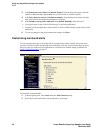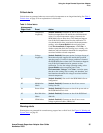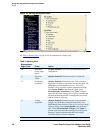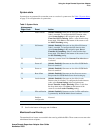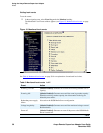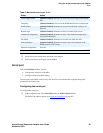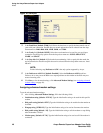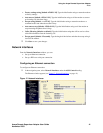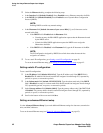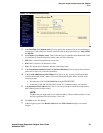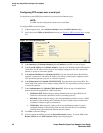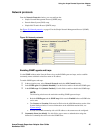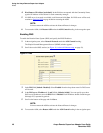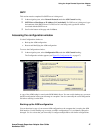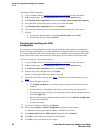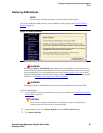
Using the Avaya Remote Supervisor Adapter
Alerts
42 Avaya Remote Supervisor Adapter User Guide
November 2003
2 Under the Ethernet heading, complete the following steps:
• In the Interface field [default: Enabled]: Set to Enabled to use a Ethernet connection for RSA.
• In the DHCP field [default: Disabled]: Set to Enabled to use a Dynamic Host Configuration
Protocol [DHCP).
NOTE:
Enabling DHCP overrides any manual settings.
• In the Hostname field [default: the name of your server-RSA]: Up to 63 characters can be
entered in this field.
• If the DHCP field is Enabled and the Hostname field:
• Contains an entry, the RSA DHCP application requests that the Hostname be used
by the DHCP server.
• Is blank, the RSA DHCP application requests the DHCP server assign the
Hostname to the RSA.
• If the DHCP field is Disabled, in the Hostname field, type the IP hostname of the RSA.
NOTE:
The IP Configuration Assigned by DHCP Server link shows what the network has
assigned as an address.
3 To set a static IP configuration, go to Setting a static IP configuration on page 42.
To set an advanced Ethernet setup, go to Setting an advanced Ethernet setup
on page 42.
Setting a static IP configuration
To set a static IP configuration:
1 In the IP address field [default: 192.11.13.6]: Type the IP address only if the DHCP field is
Disabled.The IP Address field should contain four intriguers from 0 through 255, separated by
periods, no spaces, or consecutive periods.
2 In the Subnet mask field [default: 255.255.255.254]: Type the subnet mask only if the DHCP
field is Disabled. An entry for a subnet mask field should contain four intriguers from 0 through
255, separated by periods, no spaces, or consecutive periods.
3 In the Gateway address field [default: 0.0.0.0]: Type the gateway address only if the DHCP field
is Disabled. The gateway address should contain four intriguers from 0 through 255, separated by
periods, no spaces, or consecutive periods.
4 Scroll to the bottom of the screen and click Save.
Setting an advanced Ethernet setup
Use the Advanced Ethernet Setup if you need additional Ethernet settings for data rates, transmission
units, and MAC addresses.
To set an advanced Ethernet setup (see Figure 18, Advanced Ethernet setup,
on page 43):



